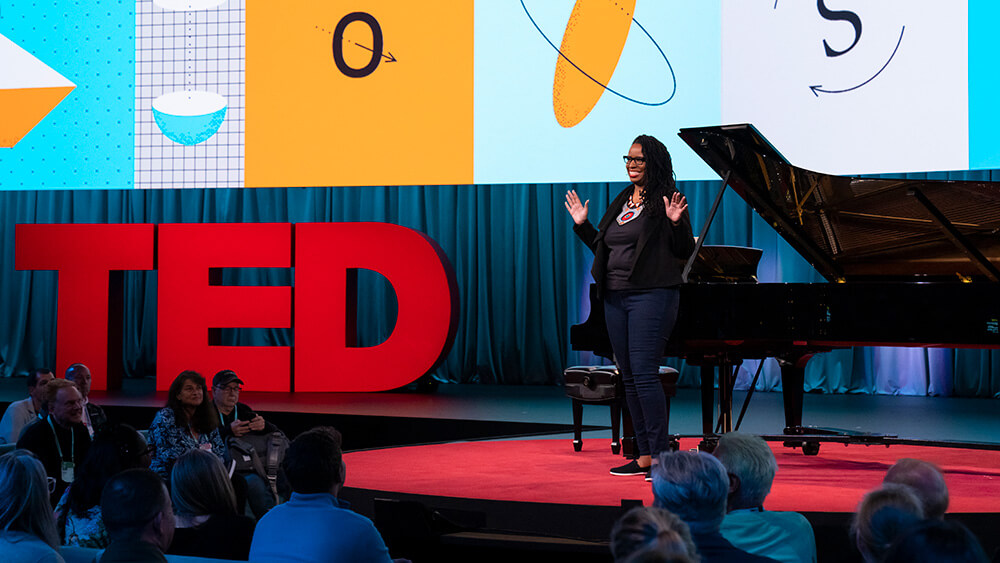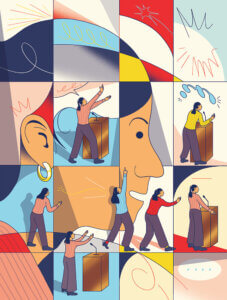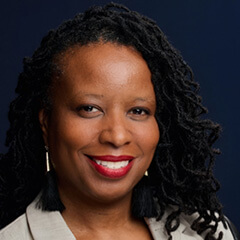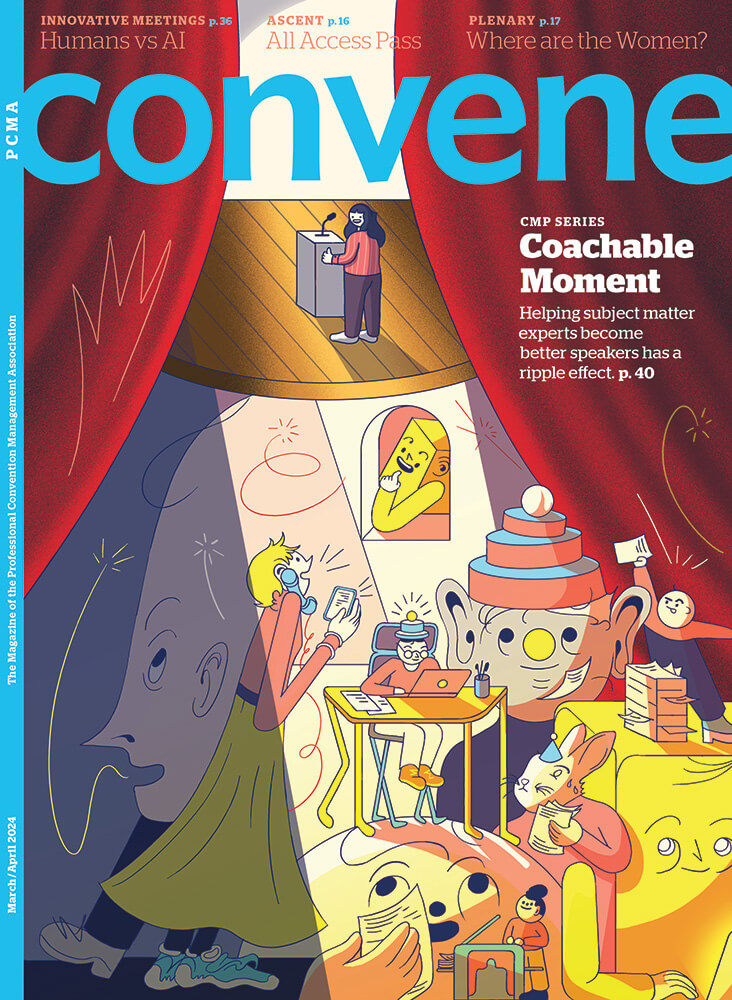
Potential event attendees still enjoy meeting in person, but they want to make sure they go to the events that are right for them, said Monique Ruff-Bell, TED’s chief program and strategy officer.
TED is celebrating its 40th anniversary this year. How has the iconic conference exploring the intersection of technology, entertainment, and design — which crafted the compelling 18-minutes-or-under presentation that has become a model for many events — evolved? And has its approach changed since the pandemic?
Convene spoke with Monique Ruff-Bell, who joined TED as head of events in January 2022, just as face-to-face events were making a return, for her perspective. Recently promoted to TED’s chief program and strategy officer, Ruff-Bell has spent more than 20 years in a variety of event professional roles, and she talked about changes at TED in the broader context of business events. Here’s what she had to say.

This story is part of the March/April Convene cover and CMP Series on speaker coaching. (Dalbert B. Vilarino illustration)
Why audiences are being more selective about what events to attend:
Pre-COVID, people were willing to travel to a dozen or so events for various reasons — professional development, getting more business in the pipeline, or even FOMO, like, “I go to CES every year, I’m not going to stop going.”
Then after the pandemic, people started changing their patterns — as in, “I’m not going to all of these events. I want events to satisfy various needs for me outside of just one thing here, one thing here, and another thing here.” The experience of events became much more powerful. [They are asking:] How are you creating an emotive experience for me that connects me to your event, not just from the content or the business, but I want all of it?
[Your audience is saying] that instead of going to a dozen events, I’m going to pick three to five. The quantity has lessened for people. They love to be in person, but they want to make sure it’s the right [event].
Why audiences have higher experience expectations:
[Audiences are saying] I want to make sure that I’m entertained. I want to make sure that I’m engaged. That I can find connections, I can do business — and I can get unique experiences that I wouldn’t be able to get anywhere else.
Now you have to figure out how to be like a Disney World for them, where you’re entertaining them in every aspect. We all know that food can kill an NPS [net promoter score] and that always has been [the case]. Now you’ve got to care even more about the full experience for people. I always say we used to be able to confidently say, “Content is king when it comes to events,” but now I feel like content may still be king, but experience is queen. There is a true partnership that goes with both of those elements.
How TED curates content:
What is unique about TED is that [it takes a very different approach] to content. I was a director of content programming for a very long time at various companies. Putting speakers and topics and themes together was my jam. Then when I came to TED and saw how they really put all of that together, it’s very different.
Speaking from a post-COVID standpoint, no one wants to just be talked at anymore. No one wants to just have the comms person feeding certain points to [them]. They want to get off-the-record conversations happening. They absolutely want to hear many more tips and tricks. They want to participate in those conversations. They don’t want just stuff to happen off the stage. Before, you could get away with the panel being very general, talking about certain aspects and certain topics, a couple of questions here and there, and it was done.

We used to be able to confidently say, ‘Content is king when it comes to events,’ but now I feel like content may still be king, but experience is queen. There is a true partnership that goes with both of those elements.
You could get away with having, if you’re a big trade show, 200 to 500 sessions and 99 percent of them would be crappy. People were still going to go because [they always went to certain shows and] love the connections [and] the experiences. Sometimes they didn’t even go to the content. Now, they want to be engaged in everything. You really have to care about that.
What’s unique about TED is they’ve always went in really understanding how to put time into programming stellar content that connects with an audience. The audience is the group they’re trying to connect with, not just each other, not to just say certain points, but they really want to have this tentacle into the audience that is making you care about something you never thought you would care about.
How TED has evolved:
We are dealing with different platforms now in the world and how people digest content. We can’t just care about the people in the room. We have to care about the media and we have to care about where we post on platforms. I’m not saying we are 100-percent there yet, but we are on this journey of how do we continue to evolve the TED Talk and the TED content experience that fits within these different platforms.
There’s a new generation of people who are watching our TED Talks, for whom two minutes is all you’ve got to make some type of impact with them. How do you make sure there is some really strong impact right at the beginning of a TED Talk to reel them in so they want to see a long version? I think we have one of the largest or the quickest TikTok followers — it has grown so much. [Editor’s note: According to TED, TEDToks have grown to 2.4 million followers in three years and have been viewed 107 million times and garnered 12 million engagements.]
We have TED-Ed. They’ve been on this trajectory with TED since K-12. It’s now a part of the zeitgeist of the U.S. and globally of how people are connecting and engaging with TED.
We have to evolve because people are now taking in content very differently. We have to continue to figure out what’s the best way to serve them.
There’s nothing like a TED Talk — it’s just amazing how we’ve had this connection with the audience and we’re such a trusted brand for a lot of people. They feel inspired and motivated. Clearly, we’re doing something right and we look forward to continuing to grow and evolve and keep that connection with our audiences.
The power of events:
I’ve always talked about how wonderful a career it is to be in the events industry. I’ve been in the industry for 24-plus years. I love to see the evolution of our industry and how we are taking things that we might’ve taken for granted a little bit more seriously — like how instead of just throwing people on stage we [are intentionally] structuring really great content. We really want to get better at it and really want people to engage with it.
Michelle Russell is editor in chief of Convene.

More From the Series
Earn one clock hour of CMP certification by visiting Convene’s CMP Series page to answer questions about this article, those listed below, and the Freeman Trends Report “2024 Attendee Intent and Behavior,” available for download.
- Inside WorldatWork’s Speaker Coaching Program
- More to come
The Certified Meeting Professional (CMP) is a registered trademark of the Events Industry Council.
